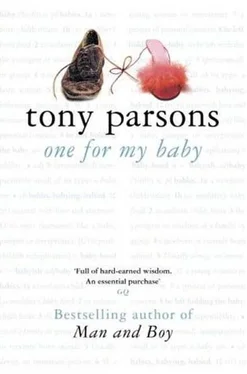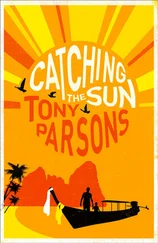“Are you kidding? I never saw anyone work as hard as you do. You’ll get your grade. Come on-tell me about life as a student. You must have thought about it.”
She laughs.
“Only for the last twelve years or so. I don’t know what it will be like. I’ll be a lot older than the other students. I’ve been married, I’ve got a kid. Most of them probably still get their washing done by their mums. And when they go off to their wild parties, I’ll be working. I’ll still have to work, you know.”
“But you think you’ll be happier?”
“I know I’ll be happier. I’ll be doing what I want to do. I’ll be making something of my life. For myself and for my daughter. And it will be interesting. Great writers, great writing, talking about ideas, being around people who care about books, who don’t worry about getting above themselves. I can’t wait.”
I can see her there. I can see her growing into the person she has always wanted to be. I can see her realizing that it’s not too late, that she is young enough and smart enough to have another go, another try at getting it right. And she will be good. It’s true she will be ten years older than the other students, but she is more than smart enough to stand out in any company; there will be no cheap jibes about Mrs. Mop or cleaning floors, because the rest of them will know all about low-paid casual work, and I can imagine her shining there, really shining, asking good questions, not afraid to put her hand up, waking up the tired teachers, inspiring the good ones, having an essay about Carson McCullers read out in class as all the young boys melt and watch the way her body moves inside her tight clothes. Or perhaps her clothes will be different too.
“I don’t want to lose touch,” I say, my face burning.
“What?”
“I don’t want you to just drift out of my life.”
“Drift out of your life?”
“I want to keep in contact. That’s all. That’s what I’m saying. I don’t see why we can’t stay in touch.”
She places her hand on my arm, and it almost feels like a gesture of pity.
“We’ll always be friends,” she tells me, and I know that I have lost her before we have even begun.
My grandmother is too sick to stay in the little white flat. Her home just doesn’t work anymore. Not for her. The stairs, the bath, the isolation from the rest of us-it is a home for someone who is old, but not for someone who is dying.
If my family were the Changs, this would be easier. Without talking about it, we would move her into a bedroom above the Shanghai Dragon and there we would care for her. But my little family is scattered all over the city, not really a family at all, my father and my mother and myself, all of us living alone, and there is no obvious place for my grandmother to go. There are too many stairs in my mum’s house, and not enough space in the rented flats where my dad and I live.
We want to be a family. We really do. But we have left it too late, we have been too distracted by other things. We will never be the Changs now.
“In China big children take care of old parents,” I hear Joyce telling my mother. “Here, other way round. Old parents still worry about big children. Everything front to back in this country.”
We discuss other options. A home-but my nan is already too ill for a home. A hospice-but we can’t bear to take her to some strange place to die. Not yet. Not if there is some other way.
There is always the hospital, but my nan fears that place more than she fears death, or at least she sees them as interchangeable, so for as long as we have other options she will be spared the hospital bed. Although she seems to eat and drink nothing and although she needs twenty-four-hour care, her doctor is happy to keep her out of the hospital, even now, even this late. But I don’t know if that reflects his compassion for a dying woman’s wishes, or just a lack of hospital beds. It is probably a bit of both.
In the end my mother takes charge, calling a stair-lift company and telling them that they have a job if they can do it immediately.
The stair-lift company must be used to these kinds of desperate calls-for who has a stair lift installed unless they are desperate?-and soon a young workman is laying what looks like railway tracks on the staircase of my mother’s home. On top of the railway tracks he fits what looks like an ejector seat, stirring childhood memories of James Bond and pilots bailing out over enemy territory. It seems to be a thing of immense violence, this stair lift, but when the young workman sits in the chair and turns it on, it whirrs into sedate action like the most gentle machine in the world.
And later, when my nan arrives, dressed in her favorite white Marks & Spencer nightdress, the one with tiny red roses all over it, her face pale from all the weeks inside her flat and from the sickness, her body so frail that I fear to touch her, for I am actually afraid that I may break her, we excitedly show her the stair lift, explaining how it will make living here easy, as if she was a child on Christmas Day being given a gift that she is too small to truly appreciate.
My father and I gently help her into the stair lift’s chair and suddenly she seems to pitch forward, weak from the tumor and the lack of food and the weeks without moving, and we both spring forward to catch her. This had never crossed our minds, that she might be too ill to use a stair lift.
Then my mum explains how the stair lift works, how you have to move a little lever to make it go and how it stops as soon as you take your hand off the lever, making it impossible to hurt yourself, at least that’s the theory, and how there’s a little wooden landing newly built at the top of the stairs so that there is not one step to climb, not even one. I do not know how much of this my grandmother takes in. She doesn’t look like one of those happy old women that you see in advertisements for stair lifts, all twinkling eyes and sensible cardigans and false teeth gleaming. My nan looks as though she never guessed that her life could be filled with so much pain, so much discomfort, so much of what she would call aggravation.
But she smiles for our sakes, even now trying to please us, trying to be a good guest, trying not to make a fuss.
“Lovely,” she says. Her ultimate compliment.
Lovely.
Then she tentatively pushes the lever of the stair lift and we all laugh out loud, including my nan, laugh out loud with shock and delight as the gentle machine whirrs into life, slowly lifting my nan up the stairs.
There she goes now, looking like a little old angel ascending to heaven in her white Marks & Spencer nightdress, smiling down on us because this is fun, it really is, and most of all because she doesn’t want us to worry about her, and she really doesn’t want to make a fuss.
T his is not me, my nan tells me, again and again. Although I know exactly what she means, I still feel that my grandmother is truly herself in these final hours.
Brave. Selfless. Funny. Concerned about everyone except herself. The old lady I love with all my heart.
“What happened to that girl?”
“What girl, Nan?”
“That nice girl.”
She makes me smile. “Oh, that nice girl.” I think she means Rose. “Rose-she passed away, remember?”
She shakes her head impatiently. “Not Rose. I know about Rose. And not the Japanese one. I know she gave you the elbow. I mean the one with the daughter. The daughter with lovely eyes.”
“Jackie?”
“Jackie. You want to hold on to her. She’s a good one.”
“You’re right, Nan. She’s a good one.”
“I want to see you settled, Alfie. I want to see you settled.”
You think that you will watch someone die with something like horror, then you watch them die with nothing but love. Because somehow the horror passes, all the black feelings caused by the thousand unspeakable indignities of cancer, or at least you learn to exist with it all. But the love remains, and it overwhelms the fear and sadness and loss, that terrible sense of loss that is worse than everything.
Читать дальше












